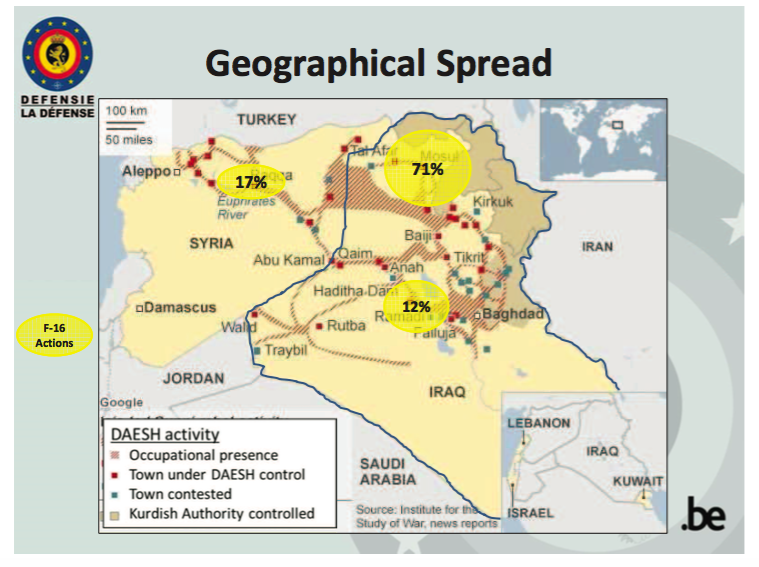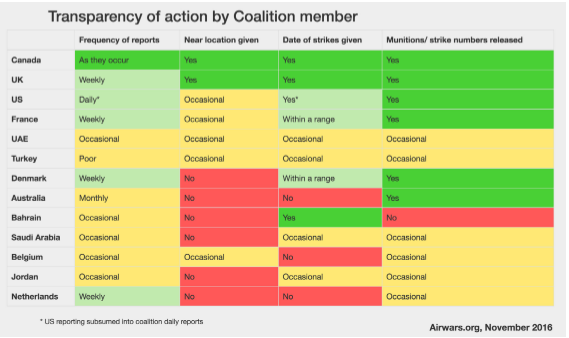The Belgian Ministry of Defence has revealed that its F-16s carried out 639 sorties in Iraq and Syria between July 2016 and March 6th 2017, as part of the ongoing international war against so-called Islamic State. Of these sorties, 45% or about 287 were kinetic actions – meaning weapons were used.
The fresh details about Belgium’s campaign were given at a press conference on March 14th – six months after the last such briefing. Belgium’s squadron of six F-16 fighters and seven pilots are conducting around 400 hours of sorties a month, or two to four sorties every day – a significant contribution from such a small force.
The Belgian campaign – which will end its second deployment in June – has been among the least transparent among Coalition partners. Even so Belgium continues to maintain that its actions have not killed or severely injured any Syrian or Iraqi civilians in more than two years of war.
Overall Airwars estimates that Belgium has now conducted around 390 airstrikes against ISIL since 2014 – with a higher than expected number of actions in Syria indicated in the latest release. This also suggests Belgium is the sixth most active member of the US-led Coalition.

Most Belgian airstrikes are focused at Mosul and Raqqa – where Airwars is also tracking high reported civilian casualties (Image source: Defensie – La Défense)
According to officials, 70 per cent of Belgian armed sorties since July 2016 have been around Mosul (down from 83% reported in September), with a further 12% in the Anbar area of Iraq, and 17% of actions near Raqqa in Syria – a rise of 10 per cent in recent months. A Coalition-backed advance on ISIL’s claimed capital has also seen record recent claims of civilian casualties.
Ministry of Defence officials have additionally reported that four types of munitions are in regular use by Belgium in Iraq and Syria – all of them 500lb or above. These are the GBU-12 laser-guided bomb; GBU-38 and GBU-31 GPS-guided munitions (the latter a 2,000lb bomb); and the GBU-54 combined laser/GPS-guided bomb. Unlike its closest ally the Netherlands, Belgium does not yet use the 250lb Small Diameter Bomb, known for its claimed precision. According to spokesman Colonel J. Poesen, “those have been ordered”.

Belgium says it is using four types of munition in its anti-ISIL strikes (Source: Defensie – La Défense)
‘No civilian casualties’
Belgium claims it applies both a lengthy pre-strike assessment process, and extensive post strike battle damage assessments for all of its airstrikes. It says that this careful approach, supported by two imagery analysts based in Ramstein in Germany, and four legal advisors including a red card holder (in Udeid, Qatar) means Belgian forces have not killed a single civilian. In the words of Colonel Poesen: “We have a clean record. Cleaner than some other countries.” However, it was later admitted that “zero risk does not exist” and that “there are limitations”.
While Belgium clearly attaches significant importance to civilian lives, a clean record would be unprecedented in a hot war such as the present anti-ISIL conflict – particularly when most strikes are now in urban areas. Airwars currently estimates that a minimum of 2,590 Iraqi and Syrian civilians have died in Coalition airstrikes – more than ten times the present Coalition estimate of 220 deaths.
Given that 70 per cent of recent Belgian actions have taken place around Mosul and 17% near Raqqa, it appears unlikely its forces have not been involved in any civilian casualty incidents. Hundreds of civilians have been credibly reported killed in airstrikes at both locations in recent months.
The Defence Ministry’s claim also cannot be tracked against the public record, since no dates or specific locations for Belgian strikes have been published – and with no details of any civilian casualty investigations made public.
In a major Airwars transparency audit published in December, Belgium was rated as one of the least transparent members of the Coalition. Press conferences and the publication of monthly updates – which the MoD appears to have resumed – are signs of some improvement. Even so, public accountability and transparency continue to be problematic. Without knowing where and when hundreds of Belgian strikes took place, the “zero civilian casualties” claim remains a claim, with the actual human cost of Belgian strikes unknown.
On March 20th, Belgian civil society is holding a conference on civilian casualty monitoring. And two days later, Airwars has been invited to present its latest transparency study to the Parliament’s Defence Committee.

